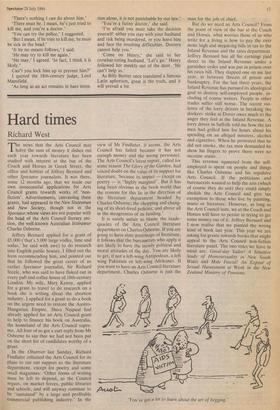Hard times
Richard West
he news that the Arts Council may
halve the sum of money it dishes out each year towards literature has been studied with interest at the bar of the Coach and Horses in Greek Street, the office and habitat of Jeffrey Bernard and other Spectator journalists. It was there, some 12 months ago, that we made our own unsuccessful applications for Arts Council grants towards works of 'non- fiction'. Advertisements, canvassing these grants, had appeared in the New Statesman and New Society, though not in the Spectator,whose views are not popular with the head of the Arts Council literary sec- tion, the well-known Australian litterateur Charles Osborne.
Jeffrey Bernard applied for a grant of £5,000 ('that's 5,000 large vodka, lime and sodas,' he said with awe) to do research into English public houses. I filled out the form recommending him, and pointed out that he followed the great career of an earlier Spectator journalist, Sir Richard Steele, who was said to have flaked out in every pub and coffee house of 18th-century London. My wife, Mary Kenny, applied for a grant to travel to do research on a book she is writing about the abortion industry. I applied for a grant to do a book on the urgent need to restore the Austro- Hungarian Empire. Shiva Naipaul had already applied for an Arts Council grant to help to finance his book on Australia, the homeland of the Arts Council supre- mo. All four of us got a curt reply from Mr Osborne to say that we had not been put on the short list of candidates worthy of a grant.
In the Observer last Sunday, Richard Findlater criticised the Arts Council for its plans to cut out support to the literature department, except for poetry and some small magazines: 'Other forms of writing must be left to depend, so the Council argues, on market forces, public libraries and schools, and will anyway continue to be "sustained" by a large and profitable commercial publishing industry.' In the view of Mr Findlater, it seems, the Arts Council has failed because it has not enough money and the wrong personnel. The Arts Council's latest report, called for some reason The Glory of the Garden, had voiced doubt on the value of its support for literature, `because its impact — except on poetry — is "highly marginal". But it has long been obvious in the book world that the reasons for this lie in the direction of the literature department headed by Charles Osborne; the chopping and chang- ing of its short-lived policies; and above all in the meagreness of its funding.'
It is surely unfair to blame the inade- quacies of the Arts Council literature department on Charles Osborne. If you are going to have state patronage of literature, it follows that the bureaucrats who apply it are likely to have the trendy political and moral attitudes of the day. You are likely to get, if not a left-wing Antipodean, a left wing Pakistani or left-wing Afrikaner. If you want to have an Arts Council literature department, Charles Osborne is just the man for the job of chief.
But do we need an Arts Council? From the point of view of the bar at the Coach and Horses, what worries those of us who write for a living is how to pay the ever more high and menacing bills in tax to the Inland Revenue and the rates department. Jeffrey Bernard has all his earnings paid direct to the Inland Revenue under a garnishee order and was put in prison over his rates bill. They slapped one on me last year, in between threats of prison and bankruptcy. For the last three years, the Inland Revenue has pursued its ideological goal to destroy self-employed people, in- cluding of course writers. People in other trades suffer still worse. The recent vio- lence of the lorry drivers in breaking the dockers' strike at Dover owes much to the anger they feel at the Inland Revenue. A lorry driver in• Suffolk told me how the tax men had grilled him for hours about his spending on an alleged mistress, alcohol and cigarettes. When he protested that he did not smoke, the tax men demanded he show his fingers to prove there were no nicotine stains.
This revenue squeezed from the self- employed is spent on people and things like Charles Osborne and his repulsive Arts Council. If the politicians and bureaucrats wanted to help the arts (which of course they do not) they could simply abolish the Arts Council and give tax exemption to those who live by painting, music or literature. However, as long as the Arts Council lasts, we at the Coach and Horses will have to persist in trying to get some money out of it. Jeffrey Bernard and I now realise that we punted the wrong kind of book last year. This year we are asking for grants towards books that might appeal to the Arts Council non-fiction literature panel. The two titles we have in mind are: Good-day Sailor! A Sensitive Study of Homosexuality in New South Wales and Male Fascist! An Exposé of Sexual Harassment at Work in the New Zealand Ministry of Pensions.
,'You've got a lot to learn about the art of begging.'










































 Previous page
Previous page